
Image: Alaina Yee / Foundry
 At a Glance
At a Glance
Expert’s Rating
Pros
- Strong security with a reasonable subscription price
- Well designed and user-friendly
- Offers a host of features in the areas of security, privacy, and performance
Cons
- No subscription option for fewer than five devices
- Simplicity of app feels slightly at odds with the depth of the PC tools
Our Verdict
With its clean, pared-down interface, Avira Prime is one of the better newbie-friendly antivirus suites we’ve seen, especially with its strong online protection. Its features include a password manager and VPN access, along with a generous helping of PC utilities to tune up your computer. However, with how advanced some of those PC tools are, Avira Prime will likely feel best to users who want to start simple but grow into more active, complex PC management.
Price When Reviewed
5 devices: $9.99/mo I $59.99/yr I $189.99/2yrs
Best Prices Today: Avira Prime
Avira Operations GmbH
$59.99
Tucked within Windows are different utilities to protect and manage your PC — but not all are easily found, much less in one spot or in an immediately understandable format.
Independent antivirus software suites try to capitalize on this weakness, but Avira Prime stands out in the field for its approach. Rivals usually go with either a simplified or advanced approach to controls and utilities. Meanwhile Avira combined an extremely pared-down, newbie-friendly interface with a boatload of PC utilities that go startlingly deep.
Not all these tools work out quite as well as advertised, but if you want to have PC maintenance demystified for you, Avira Prime can get you started — while still providing strong threat protection.
Future reading: See our roundup of the best antivirus for Windows PCs to learn about competing products.
What does Avira Prime include?
At the core of this security suite are its malware, network, and web defenses. The antivirus engine scans continuously for real-time threats, including ransomware, shady websites, and malicious downloads. Meanwhile, the firewall blocks potential network intrusions and suspicious app traffic. The subscription also comes with two services that protect against online dangers: a password manager and an unlimited VPN. Rounding out the safeguards is dark web monitoring, which keeps watch for your information in data leaks and breaches.
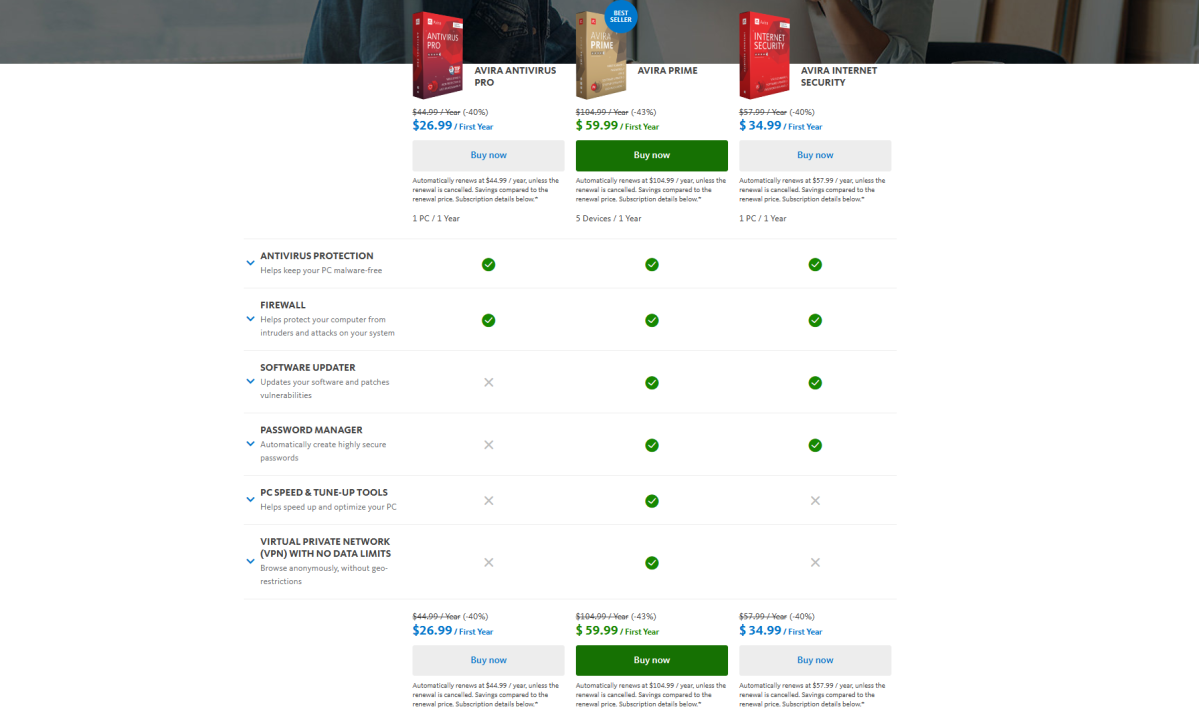
PCWorld
PCWorld
PCWorld
Avira Prime includes PC performance tools as well, but unlike other antivirus suites, it’s unique in how many it offers. You get utilities to speed up your computer, save your laptop’s battery life, keep your apps and drivers up to date, boost game performance, find duplicate files hogging storage, and shred sensitive data. Avira Prime also has a wealth of backup options that go beyond just files—you can back up and restore your Windows registry and master boot record, too.
Surprisingly, Avira Prime does not contain any parental controls — in fact, the Avira website points users to Windows’ own set of content filters, app controls, and time limits.
How much does Avira Prime cost?
If you buy from Avira directly, the Avira Prime subscription costs $60 for the first year, then increases to $105 afterward. A free 60-day trial exists, though you must put down payment info at sign-up.
Plans come with a separate 60-day money-back guarantee for annual plans, and a 14-day refund window for monthly plans. Avira automatically enrolls subscribers into auto-renewal at sign-up.
Avira Prime (5-devices)
- $60 for the first year
- $105 per year thereafter
The default plan for Avira Prime includes five devices, but if you need more, you can upgrade to the 25-device plan for $130 per year. Your device limit can be shared as you see fit, and across Windows, macOS, Android, and iOS. However, unlike a true family plan (which lets you share across separate accounts), you’ll have to use your one account to log into each device.
Unlike with more popular antivirus suites, you can’t buy Avira Prime subscription codes at a discount from third-party retailers.
Key features of Avira Prime
Installation and user interface
Upon installation, Avira Prime shows a prompt to start a smart scan — which you can proceed with or choose to be reminded about later. (It’s advised to perform the scan.)
The app has an easy-to-navigate interface, with a dark gray-and-black theme as the default. (You can switch it to a light theme by going into the settings.) Like many other antivirus programs, the layout is split between a left navigation bar and a main panel. Avira’s take on this standard feels cleaner and more modern, though — in part due to the simplicity of its features and settings.
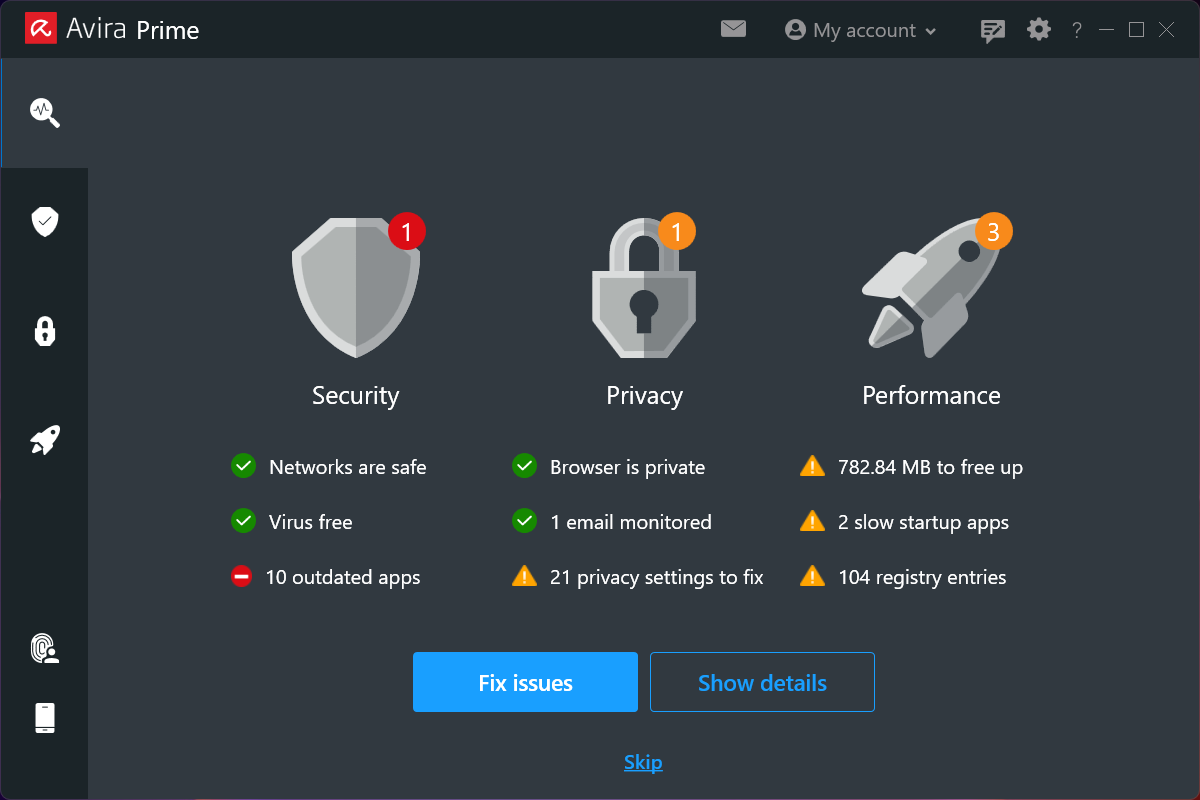
PCWorld
PCWorld
PCWorld
The left navbar has just four main options. At the top is Status, which shows the status screen you’ll see whenever reopening the program. However, instead of serving as a dashboard, you can only run a smart scan or see Avira’s latest assessment of your PC. To run other scans you must head to the Security tab, which has options for full, quick, or custom virus scans. The security tab also gives access to protection settings, quarantine, the software updater tool, and the firewall. Additional safeguards like the password manager and VPN live under Privacy, along with the file shredder, privacy settings, and links to the Avira Safe Shopping browser extension, Avira secure browser, and dark web monitoring in the Avira web portal.
As for the many PC utilities bundled with Avira Prime, you can find those in Performance, which either pops you over to built-in Windows tools or to the Avira System Speedup Pro app.
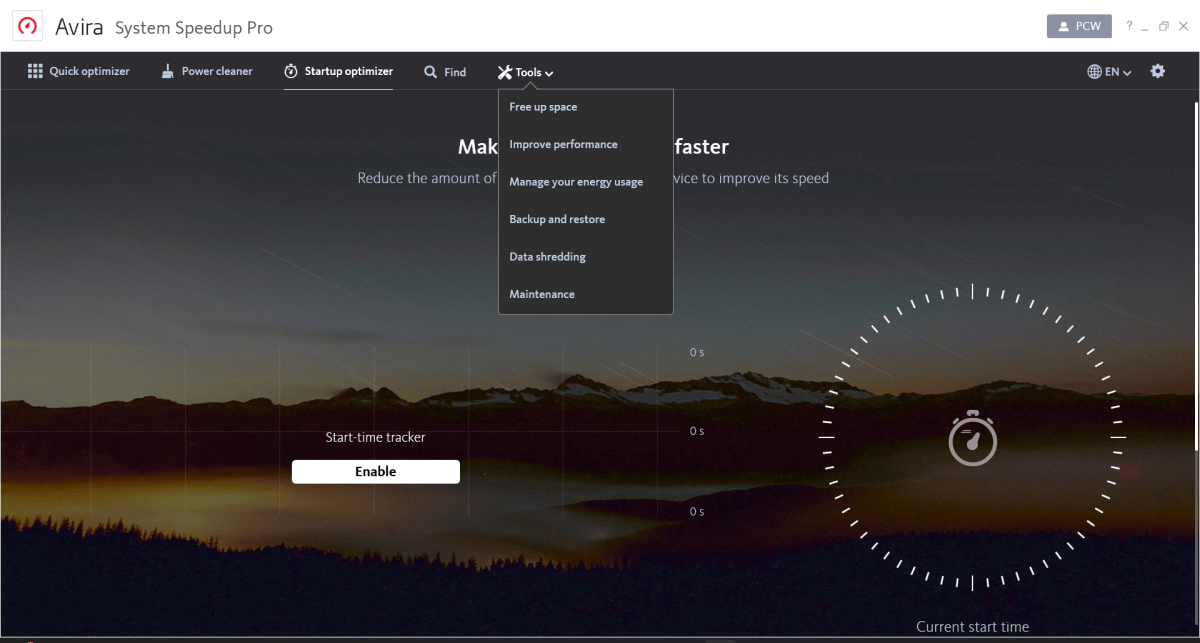
PCWorld
PCWorld
PCWorld
If you need help with Avira, want to look up info in your account, or change the software’s settings (including tweaks to how scans run), you’ll find these options as small icons at the top right of the app. It can feel a little cluttered (and I’ve more than once minimized the window when aiming for the help options), but it’s clear enough.
Virus, malware, and threat protection
Real-time protection
Generally, Avira Prime monitors for real-time threats to your PC, both online and offline. On the web, it watches for websites containing phishing links and malware, and also checks the traffic going to and from your computer for suspicious activity. You can customize what sites are automatically blocked or allowed in the app’s settings.
On your PC, Avira examines files you open or add, as well as downloaded emails and attached drives (including network drives). However, the software does not check archive files (e.g., zipped files) as part of real-time scanning — you’ll have to flip that on in the settings if so desired. The app also doesn’t lock down specific folders as part of its ransomware protections. Instead, it relies solely on its detection capabilities to stop such attacks from happening.
Dark web monitoring is also included with Avira Prime, though it’s stingier than most rival plans. It only watches just one email address (the one associated with your account) when new data leaks and breaches appear on the shady side of the internet.
Scheduled and manual scans
For scheduled scans, two of them are automatically set up during installation. A quick scan will be performed once per week, and an active process scan happens daily.
You can also schedule your own custom scans, or add a schedule to the other preconfigured scans (Full, Removable Drive, and Windows System). You’ll do this from Security > Virus scans > Manage scans. When creating a schedule, you can choose only daily, weekly, or monthly intervals. If you want more sophisticated timing, you’ll need to go with an entirely different antivirus suite all together (e.g., ESET Home Security Premium).
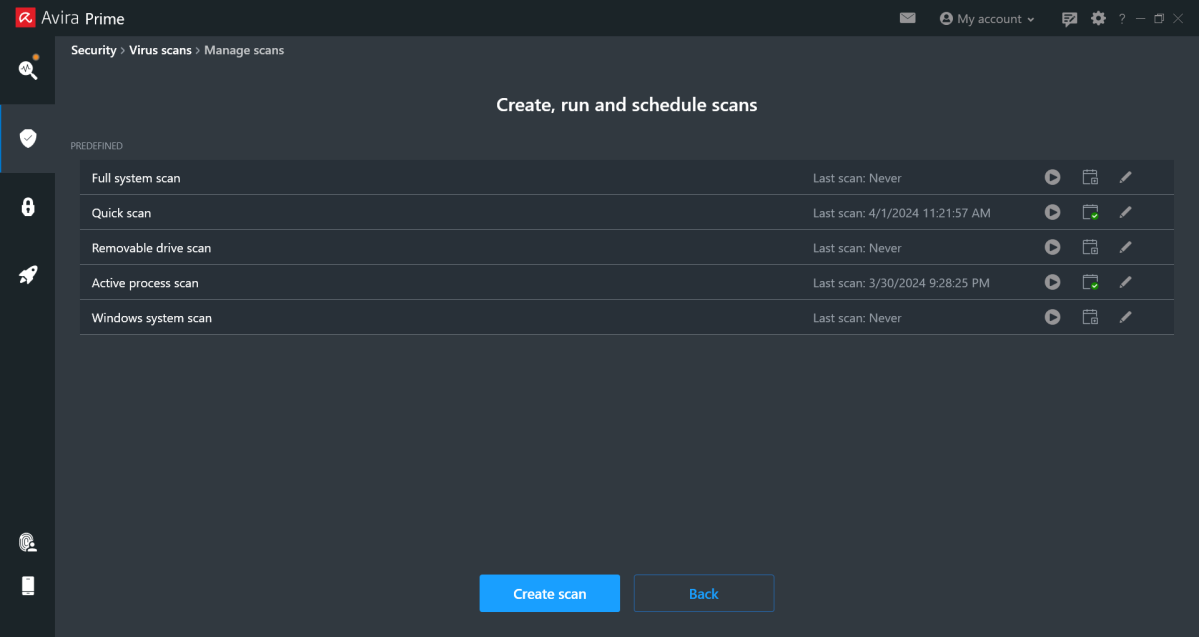
PCWorld
PCWorld
PCWorld
For manual scans, you can choose Smart Scan on the Status screen, or pick between a Full Scan and Quick Scan on the Security > Virus Scans screen. A Smart Scan combines together a check for malware, privacy, and performance issues, while a quick scan looks for malware in commonly targeted areas of your computer. A full scan is the most thorough (and what we suggest you schedule at least once a month) — it combs through your system files, active processes in Windows, local drives, and removable drives. You can create simple custom scans as well, which let you focus on specific drives and/or folders, and then also choose a frequency for scheduling if so desired and the handling of suspicious files.
Scheduled and manual scans only check over recommended file types, and don’t scan files again unless they’ve changed since last marked as clean. You can adjust the protection settings so that all file types get looked over, however. And you can lightly tweak what threats get flagged during scans. The defaults cover most bases, but those who have riskier online habits may want to activate a higher level of screening.
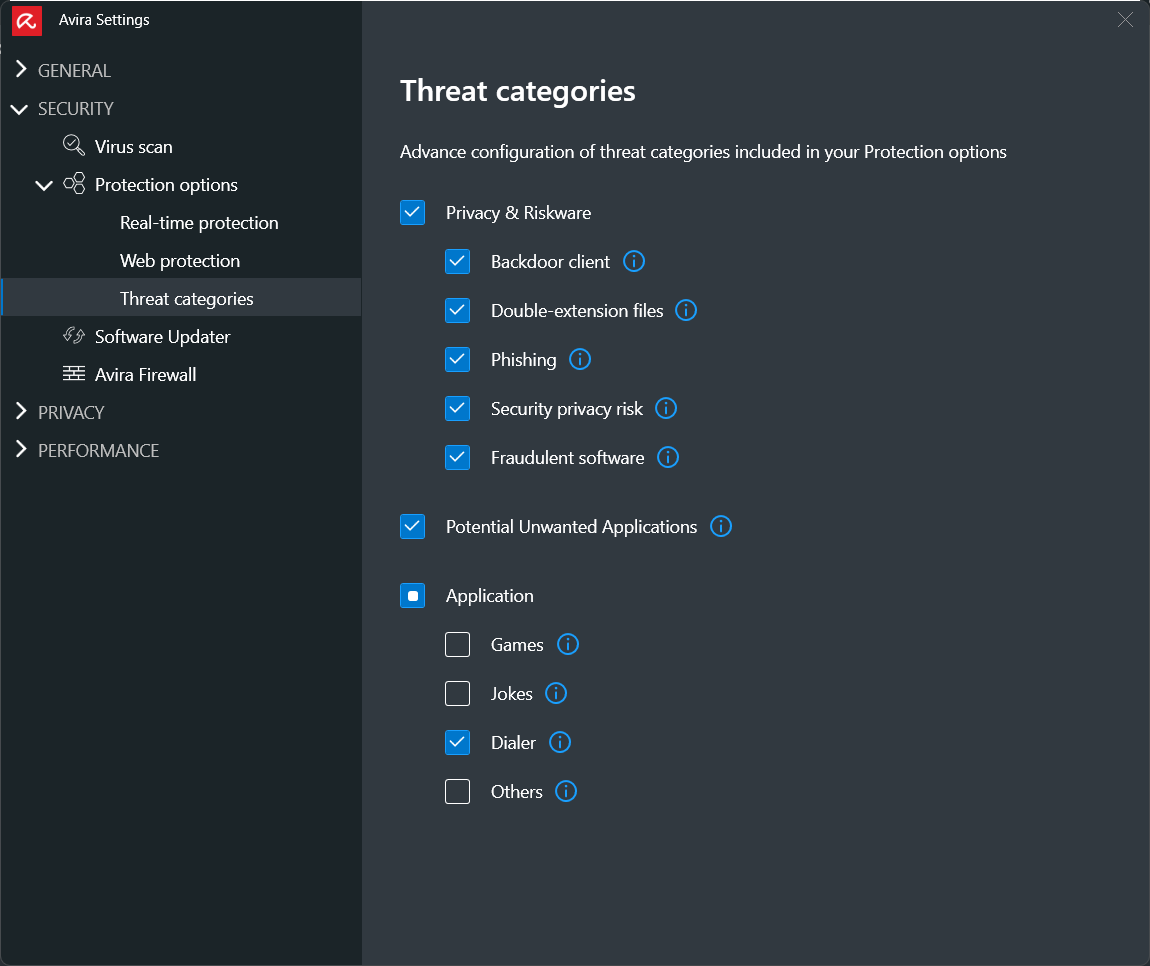
PCWorld
PCWorld
PCWorld
Firewall
Avira Prime takes over for Windows’ default protection, screening all traffic going to and from your computer. It has a very straightforward and simple interface, with a layout that’s easy to understand and feels less intimidating. App permissions are displayed in a simple list, letting you quickly tell which Windows programs and services are online and also change how deeply Avira should trust them. More advanced users can adjust what IP addresses are allowed to connect to your PC, too.
Generally the default settings work well — most people shouldn’t need to adjust them.
Additional features
Avira Password Manager Pro
Avira Prime includes a password manager, albeit one that feels a little bare-bones. On PC, the browser extension gets automatically installed, and it’s the only way to access the service — there’s no separate dedicated website.
Setup is relatively easy. While logged into your Avira account, you’ll create a master password to safeguard your vault. You absolutely cannot forget this primary password; if you forget it, you won’t be able to recover your account.
The interface is clean but basic, with the ability to only add passwords, notes, and credit card entries to your vault. The amount of info you can add to each entry type is limited, too, though Avira does allow you to color code and tag them for better organization.
When testing the password manager, I found that the extension picks up new login information well, and also provides a seamless way to pick a new password for an account signup. For anyone needing a password manager (aka everyone), this included browser is a good, unintimidating start. In a nice touch, Avira cross-checks any vault entries against Have I Been Pwned’s data breach database for any of your login info, so that you can be alerted and quickly update an entry if need be.
The only drawback to using this included password manager is its settings are also simplified. Two-factor authentication is limited to just SMS codes, and you can’t set a passcode to make access to the vault faster and easier. Nor can you set it to automatically clear the clipboard when copying login info. For these kinds of features, you’ll need to choose a different password manager.
Avira Secure Browser
If you don’t trust Chrome, Edge, and Firefox to be secure (or don’t want to configure them to be so), the Avira Secure Browser is an alternative you can install. Like Google’s browser, it’s based on Chromium, but much more locked down.
The preconfigured settings make Avira’s own search engine the default, and automatically adds an extension that blocks trackers and advertisements. Oddly, Avira’s password manager extension is not preinstalled, though you can download it on your own. But you do get a coupon extension as part of the browser, which feels like a conflict with protecting user privacy.
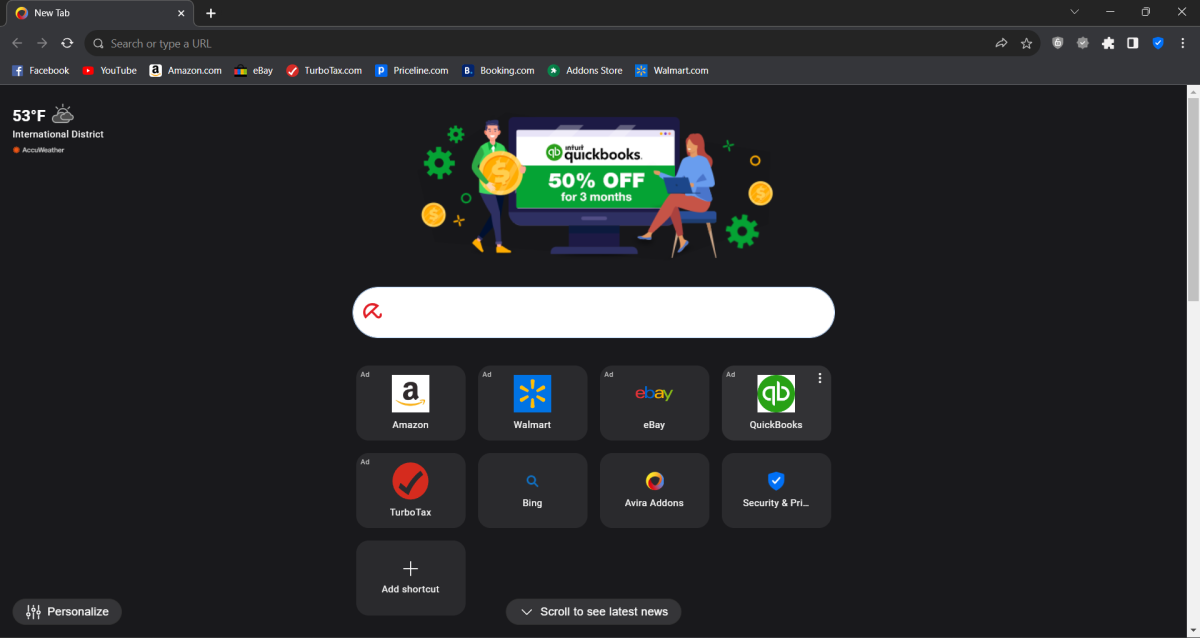
PCWorld
PCWorld
PCWorld
Generally, this optional browser feels like a customized version of Chrome. But while seemingly more limited, it doesn’t actually prevent downloads of extensions that could compromise your security. But it works fine, so long as you want Avira’s guiding hand upon your software.
Avira System Speedup Pro
Buried within Avira Prime are several sub-programs — secondary apps that only appear if you start them from within the Avira software. Avira System Speedup Pro is one that packs in multiple PC utilities.
Arguably, this collection of tools is what set Avira Prime apart from its competition. Rival security software usually includes just a few utilities for your computer, and rarely complex. Avira Prime goes the extra mile by imitating or linking directly to what you can already do within Windows, and then wrapping it in a friendlier interface. It doesn’t just help identify storage space you can reclaim and performance improvements. It goes beyond battery optimization, too. Dig into System Speedup and you can get a comprehensive overview of what’s happening with your PC.
Avira Prime goes the extra mile by imitating or linking directly to what you can already do within Windows, and then wrapping it in a friendlier interface.
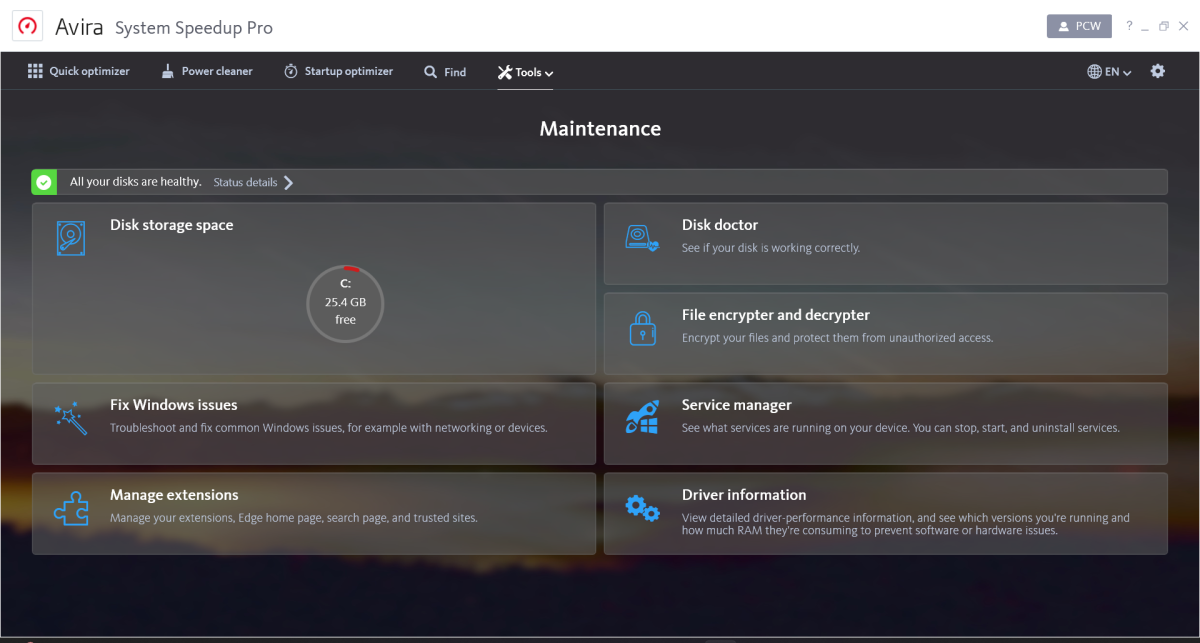
PCWorld
PCWorld
PCWorld
Need to fix Windows issues? You get a shortcut that jumps you to the Windows settings menu for that. Suspect something’s wrong with one of your drives? You can run Avira’s disk doctor scan. Not sure what services are running on your PC, or what drivers are installed? You can open lists that clearly show those details.
If anything, the one drawback to the tool is how much it covers. The contrast with the main Avira app’s simplicity may be too much of a jump for users seeking ultra ease of use, but yet still wanting more than the recommendations made by the smart scan. For example, Avira’s backup and restore options include backing up the Windows registry and the master boot record. The vast majority of people will never (and should never) touch their registry or MBR, so specific backups aren’t fully necessary.
For most users, the two best utilities will likely be the file shredder (a secure delete tool for your files) and the file encryption/decryption tool (which helps you more tightly guard specific files from prying eyes). However, both are extremely simple in their interface, which may end up feeling too limited if you want more control over settings. A third utility, the duplicate file finder, can be partially helpful in tracking down redundant files, but it’s not sophisticated enough to pick out files identical in data but not in name.
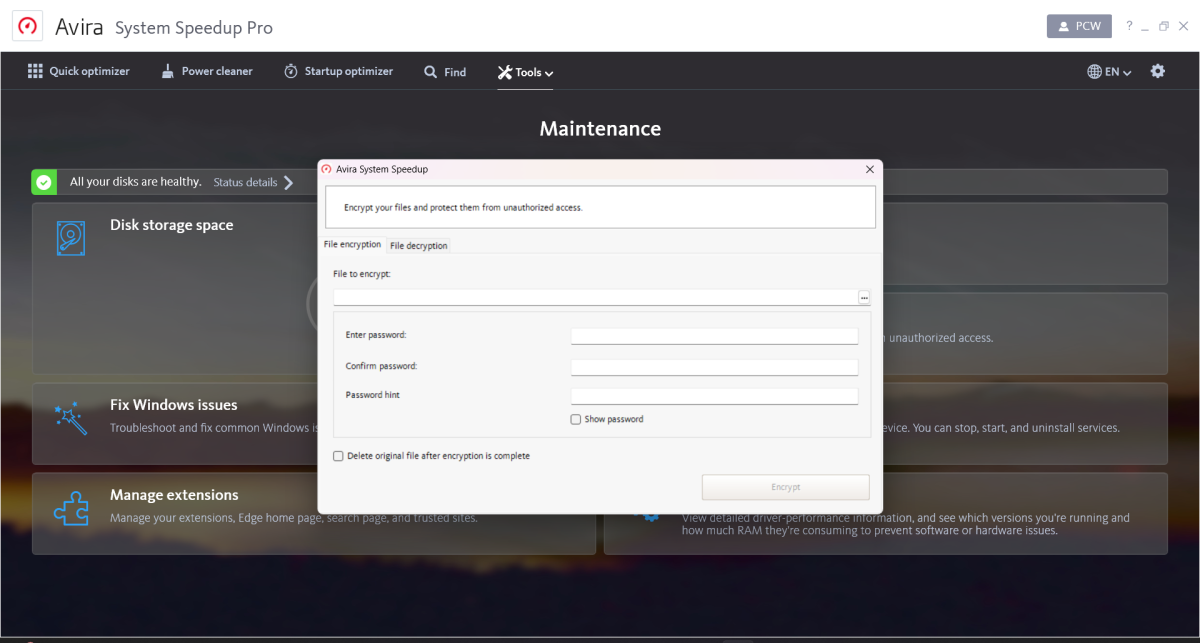
PCWorld
PCWorld
PCWorld
Browser extensions
When installed on the PCWorld test laptop, Avira Prime automatically added the Avira Safe Shopping browser extension to Microsoft Edge. It serves a dual function, acting as an extra set of defenses against online threats while also hunting for shopping deals on the web.
At least it does for Edge, Opera, and Firefox. On Chrome, Avira Safe Shopping only offers the shopping assistance. But Chrome users aren’t actually left out — they can also install the Avira Browser Safety extension, which handles those online protections.
No matter which browser you use, the extension’s utility feels limited. Its primary benefit is the addition of visual badges to signal safe links in search results — but that feature only works when using Bing. It does also block ads and trackers, so long as you go into the settings and switch it on. However, other excellent extensions (like uBlock Origin) can handle those jobs as well, and do so automatically.
VPN
Accessing the VPN through the Avira app is a little less convenient than other antivirus suites. To get started, you must navigate to Privacy > VPN. There you can start the VPN with basic settings, or open Avira Phantom VPN Pro companion app by clicking on the Advanced settings link.
The Avira Phantom VPN Pro app is the only way to adjust those advanced settings. You can activate automatic internet shut-off when the VPN connection drops, auto-connect when on Wi-Fi, launch at Windows startup, and the blocking of malicious sites and content. None of these settings are on by default.
Selecting a location and connecting to it are easy in both Avira Prime and Avira Phantom VPN Pro, but I preferred the Avira Prime app since you can maximize the window and see more of the available servers at one time.
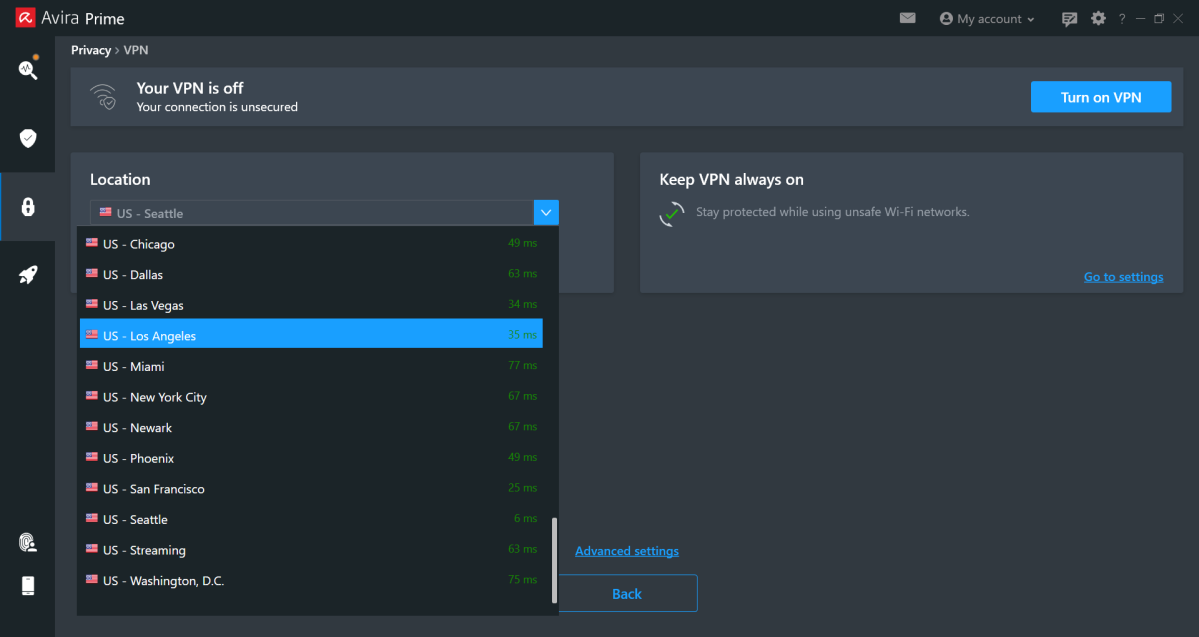
PCWorld
PCWorld
PCWorld
For servers, you get a choice of 35 countries, with three English-language countries offering specific cities for selection: Australia (Perth, Sydney), Austria, Belgium, Brazil, Bulgaria, Canada, Chile, Czech Republic, Denmark, Finland, France, Germany, Greece, Hong Kong, Hungary, Iceland, Isle of Man, Israel, Italy, Japan, Mexico, Moldova, Netherlands, New Zealand, Norway, Poland, Romania, Serbia, Singapore, Slovenia, Spain, Sweden, Switzerland, United Kingdom (London, Manchester), United States (Atlanta, Chicago, Dallas, Las Vegas, Los Angeles, Miami, New York City, Newark, Phoenix, San Francisco, Seattle, Streaming, Washington DC).
Customer support
For help with Avira Prime, you can lean on the company’s knowledge base, community forums, or support team — but finding each can be a little circuitous. The easiest way to find all three is by clicking the question mark icon in the upper-right of the Avira app, then choosing Contact support. The support page on the Avira web portal will open, which has links to all forms of assistance, including chat, email, and phone support. However, I did run into authentication issues with the community forums in Microsoft Edge on a secondary PC, which was only fixed by deleting cookies and logging into the portal again.
Updates and maintenance
By default, Avira Prime automatically checks for virus and app updates every two hours, though you can adjust this time interval to be more or less frequent (as often as 30 minutes or as delayed as 12 hours). You can also run a manual update, which is buried in the help menu. To access the option, you must click on the question mark icon in the upper-right corner of the app, then chose About.
Performance
Avira’s antivirus engine generally protects well against malware, though it’s edged out in performance by the top suites in tests conducted by leading security research institutions. In AV-Test’s zero-day attack and malware evaluation for March and April 2024 (the most current results released), it caught 100 percent of the 316 zero-day threats in March and 99.4 percent in April. Meanwhile, it blocked 100 percent of the 19,228 samples of recently discovered and widespread malware.
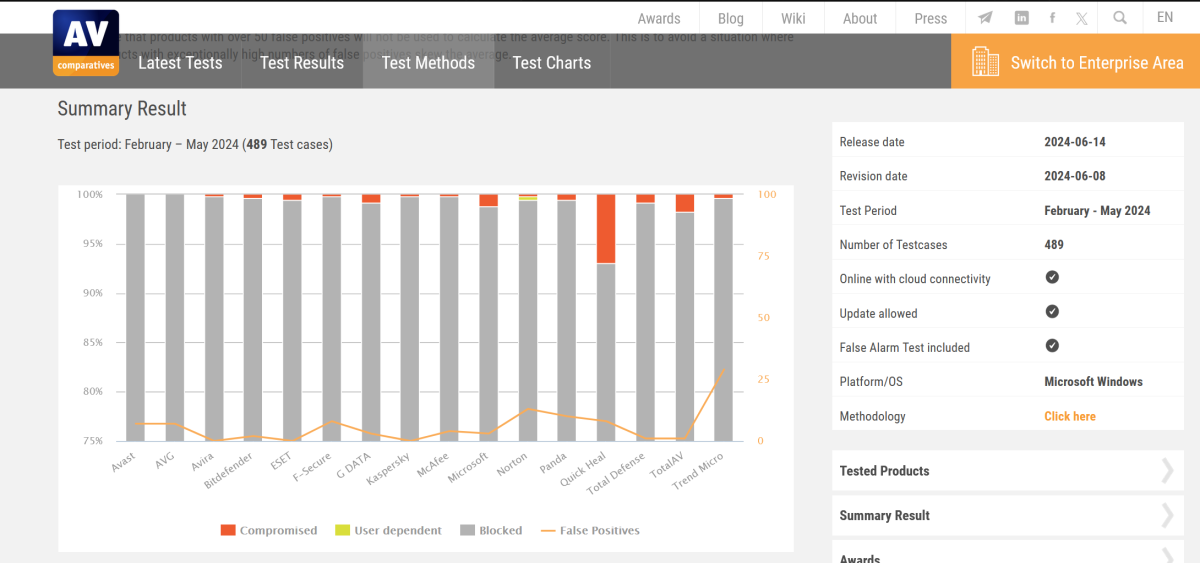
AV-Comparatives’ real-world test results for February through May 2024.
AV-Comparatives’ real-world test results for February through May 2024.
PCWorld
AV-Comparatives’ real-world test results for February through May 2024.
PCWorld
PCWorld
Avira performed similarly in AV-Comparatives’ real-world protection test for February through May 2024, which evaluates how well an antivirus suite catches threats like exploits and malicious URLs during typical online activities (e.g., web browsing). It blocked 99.8 percent of the 489 test cases, with no false positives. When faced with AV-Comparatives’ March 2024 malware protection test, which checks antivirus software’s ability to stop malware from spreading off network, USB, or local drives, Avira Prime posted similarly strong results. It had a 99.95 percent online protection, 98.9 percent online detection rate, and 94.3 percent offline detection rate.
When up against AV-Comparison’s test for sophisticated, targeted threats, Avira fell behind the rest of the pack — it spotted just 8 of the 15 test cases in AV-Comparatives’ November 2023 Advanced Threat Protection Test, which imitates zero-day attacks and involves threats like malicious scripts and fileless exploits. However, Avira’s higher-performing rivals still missed test cases, suggesting that antivirus vendors are still hardening their defenses in this area.
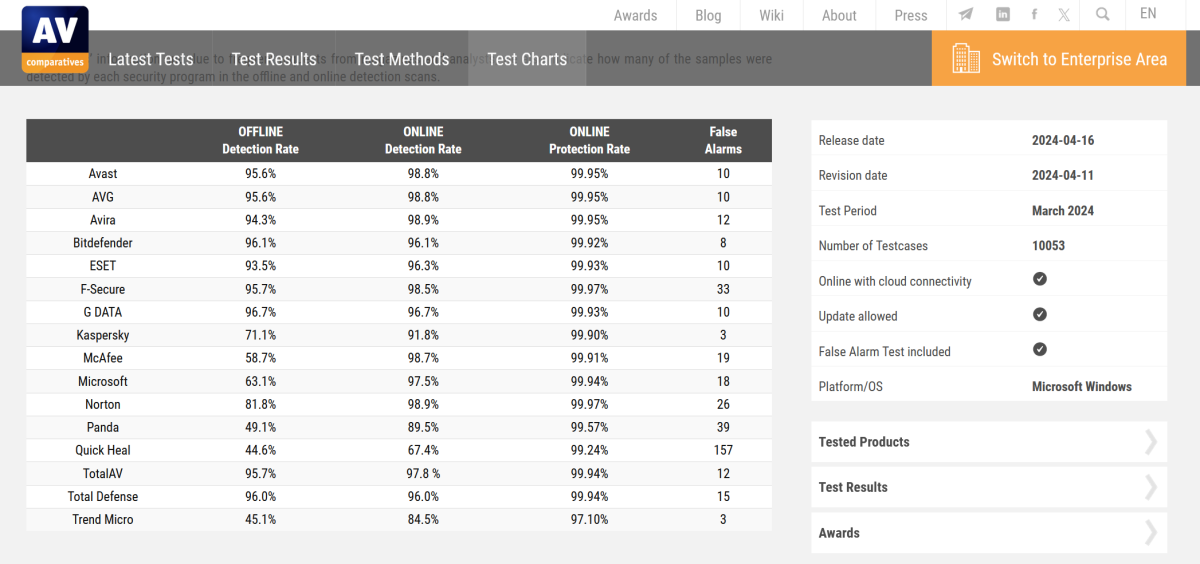
AV-Comparatives’ malware test results for March 2024.
AV-Comparatives’ malware test results for March 2024.
PCWorld
AV-Comparatives’ malware test results for March 2024.
PCWorld
PCWorld
During most typical tasks on a PC, Avira Prime should have a mild effect on system performance when hanging out in the background. Scores in PCMark 10’s Extended benchmark, which simulates web browsing, video chatting, gaming, and image and document editing in free, open-source apps, didn’t budge after installing Avira Prime. Results also barely changed when running our Handbrake encoding test, which converts a large uncompressed video into a smaller version. Avira goes more on the offensive when Microsoft Office apps are active; in UL Procyon’s Office Productivity benchmark, which involves Microsoft Word, Excel, and other document use, the real-time scanning caused an almost 9 percent decrease in results.
However, when Avira Prime is fully active and running a comprehensive scan, it can hammer a PC’s system resources hard. On our test laptop, which is a budget model, a full scan that investigated all files made benchmark scores plummet. PCMark 10 results dropped by almost 30 percent, while Procyon and Handbrake scores nosedived by nearly 50 percent.
In the real world, your PC likely won’t suffer this hard — or at least, it won’t need to. Our full-scan test is more of a torture test; it simulates the biggest impact an antivirus suite could have on your PC. Most people will use default settings that skip over files marked safe in previous scans and file types that aren’t of concern, which lightens the load on a computer. Typically, if you run full scans during off-hours (like when you’re asleep), they won’t interfere with normal everyday tasks and document editing. You’ll instead see a performance effect more similar to Avira’s real-time scanning state. But if you regularly change, add, or edit files to your system in bulk, it’ll affect your PC proportionately.
Should you buy Avira Prime?
Avira Prime is one of the more user-friendly apps available, and arguably the most beginner-friendly at that. Its interface reduces how intimidating digital security can be, especially when trying to keep everything straight, and its feature set amply covers not just PC protection, but also maintenance, too. This software’s only real weakness is not helping better close the gap between the simple presentation and the experience needed to know when to use a particular feature (if at all) — but for the willing, a few internet searches can solve that issue pretty fast.
Best Prices Today: Avira Prime
Avira Operations GmbH
$59.99
Author: Alaina Yee, Senior Editor, PCWorld

A 14-year veteran of technology and video games journalism, Alaina Yee covers a variety of topics for PCWorld. Since joining the team in 2016, she’s written about CPUs, Windows, PC building, Chrome, Raspberry Pi, and much more—while also serving as PCWorld’s resident bargain hunter (#slickdeals). Currently her focus is on security, helping people understand how best to protect themselves online. Her work has previously appeared in PC Gamer, IGN, Maximum PC, and Official Xbox Magazine.





